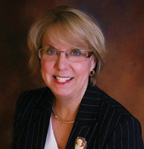
Diane Nygaard, Kenner Schmidt Nygaard
Meet Diane Nygaard, living proof that success breeds success. Last year, she was co-lead counsel in a class-action lawsuit that ended with a $200 million settlement. It’s the kind of outcome that can stand as a filigree on a lawyer’s career—or serve as a stepping stone to bigger and better things. “The outcome has meant that we are being approached with larger potential class-action cases and complex cases,” Nygaard says, reflecting on what’s happened since last December’s settlement. “Personally, it means that I have become more selective in deciding which cases to accept.” Nygaard’s track record shows that she’s got it in for the bad guys in business, and they seem to have left her a target-rich environment. She has represented investors from around the nation, even international clients, in securities arbitrations against Financial advisers, stockbrokers, c-suite executives and money managers. From losses due to churning to Ponzi schemes, from retirement-plan investment fraud to simple securities fraud cases, she has gone to arbitration and to trial with notable success.
The $200 million Kinder-Morgan case, based on a shareholder derivative claim, was a milestone, but not her first nine-figure outcome. She was also part of two race-discrimination cases against Metropolitan Life Insurance Co. and Unitrin, and each of those settlements topped $100,000,000, she said. They involved social injustice practiced from the corporate suite, something that gets her ire up. “The companies had been charging minorities more for life insurance—literally using two different rate books for decades,” she said. She also preaches the gospel of corporate responsibility overseas, teaching securities law in law schools and presenting a course on how corporations are formed, raise capital and issue stock—in accordance with the U.S. securities law, of course.
Earlier in her career, Nygaard worked the defense side of such cases, representing big-name investment companies. Her emphasis shifted in part, she said, because she was “seeing people in my office who worked hard, saved their money, invested in the stock market and had little return, if any to show for it” as a result of corporate-sanctioned shenanigans. “For me,” she said, “this is about doing the right thing.”
Return to Ingram's September 2011